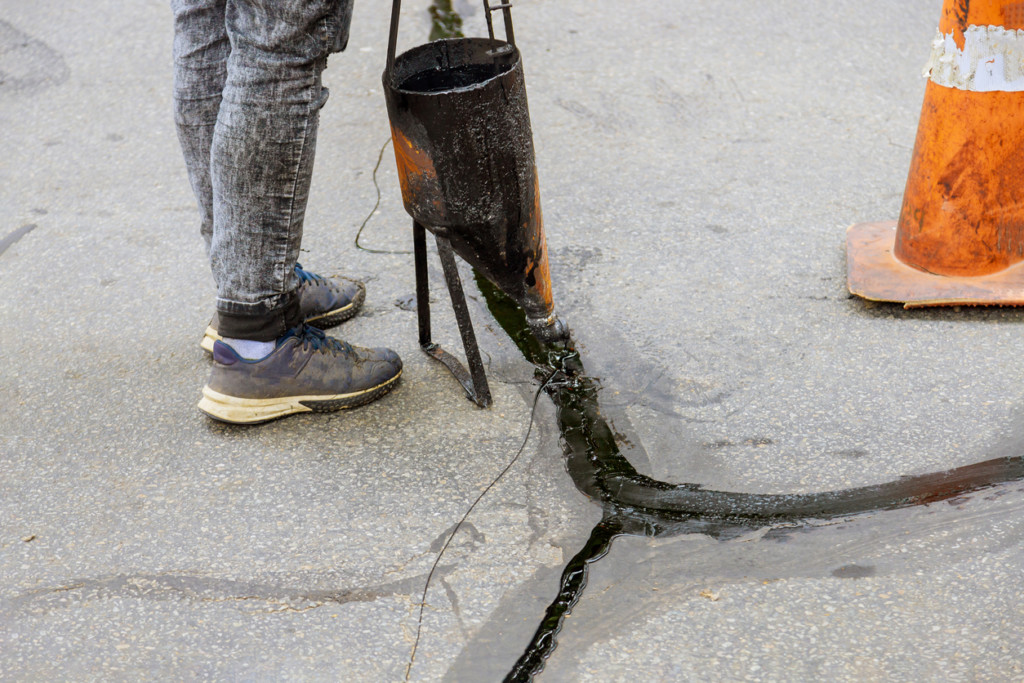
Does your asphalt driveway need repair? Although asphalt is a highly durable paving material, it is still subject to wear and tear from weather and vehicular traffic over time. When should you consider repairing your asphalt driveway? What is involved in asphalt repair? This comprehensive guide to asphalt repair answers these questions and many more.
Signs Your Driveway Needs Repair
Asphalt driveways tend to show the following signs of wear and tear:
- Cracks. Because of temperature fluctuations and the weight of vehicles, asphalt is prone to cracking.
- Potholes. Potholes can appear in your asphalt when water sits in certain areas or when cracks become severe.
- Low spots. The ground beneath can become uneven if water seeps into cracks and under the asphalt. These low spots will become worse as water collects.
- Discoloration. There may be some spots on your driveway that become discolored due to damage caused by motor oil, leaves and plant debris, as well as snow and ice.
Any time you observe any of these signs, you should contact a residential asphalt paving company.
Repair vs. Replacement
It may be necessary to repair your asphalt in some cases. Other times, it may be necessary to completely replace your asphalt. Depending on the circumstances, your needs may fall somewhere in between. How can you determine what you need for your driveway? Hire a professional asphalt paving company to assess your driveway and make any necessary repairs.
- Crack Sealing. If your driveway is in decent shape but has some cracks, you may only need crack sealant applied. When the cracks are filled and sealed, the cracks will be prevented from getting worse and moisture will be prevented from penetrating into the sublayer.
- Pothole Repair. It is imperative that you fill and repair any potholes that may exist on your driveway. Potholes, like cracks, will only deteriorate over time. If you deal with them early, they can be repaired and you do not have to undergo a complete resurfacing.
- Resurfacing. If your driveway has extensive cracks, potholes, and other damage, it may be necessary to completely resurface it. A new layer of asphalt is laid down after scraping off the damaged top layer. Even so, it is still simpler than starting from scratch.
- Complete Replacement. If the sublayer beneath your driveway has been damaged by moisture and is no longer even, you may need to completely resurface it. You have to tear up the old asphalt, prepare a new surface, and put down new asphalt.
Preventing Damage with Asphalt Maintenance
It is important to maintain your driveway regularly to prevent cracks, potholes, and other damages. The main aspect of asphalt maintenance is periodic sealing. Your asphalt driveway should be sealed every three to five years. The purpose of this is to prevent moisture from entering small cracks and to prevent them from becoming larger. Your driveway will be fully protected from the effects of weather and vehicles when you have professional sealcoating applied.
Signs Your Sealcoating is Working
You can determine if your driveway requires new sealcoating by checking it after it has rained. A small amount of water should bead up as small droplets, indicating that it is being repelled rather than absorbed. If you do not see this, you may need to seal your driveway.
Asphalt Repair and Weather
The weather plays an important role in asphalt paving and repair. In order to sealcoat a concrete surface, you only need about three days of dry weather. You’ll need 5-7 days of dry weather for new paving or asphalt replacement.
Residential Paving by Toronto Pavings
Do you need to replace or repair your driveway? Toronto Pavings provides a full range of residential paving services. We’ll check out your driveway and recommend the best way to fix it. As well as repairing your driveway, we also offer asphalt maintenance services.
Call 123-456-789today to request service or get a free quote. Our team looks forward to helping you maintain and restore your asphalt driveway.

